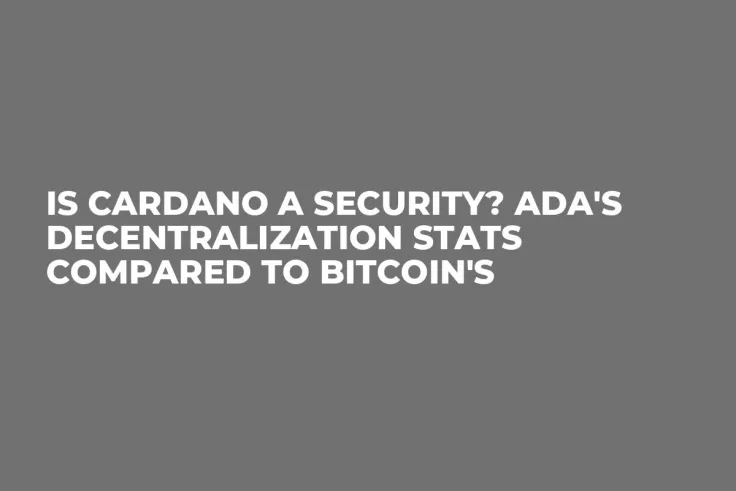
Disclaimer: The opinions expressed by our writers are their own and do not represent the views of U.Today. The financial and market information provided on U.Today is intended for informational purposes only. U.Today is not liable for any financial losses incurred while trading cryptocurrencies. Conduct your own research by contacting financial experts before making any investment decisions. We believe that all content is accurate as of the date of publication, but certain offers mentioned may no longer be available.
The crackdowns on the duo of Coinbase and Binance exchanges by the United States Securities and Exchange Commission (SEC) and the indictment of top cryptocurrencies like Cardano (ADA) has drawn different commentaries from across the industry. One of these is whether or not Cardano is a security and key protocol validator. Cardanians have shared key numbers that depict the decentralized status of the ADA and thus invalidate the SEC's stance that the coin is a security.
If the SEC examines whether Cardano or Bitcoin is more decentralized, I'm sure Cardano will win.
— Cardanians | stake with CRDN3 (@Cardanians_io) June 8, 2023
Decentralization has two levels: block production and team (governance).
Decentralization is based on holding a scarce resource. In the case of Cardano, it is the ADA coin, in the… pic.twitter.com/K34y1rFT4c
Cardanians' argument
The Cardanians long-form tweet compares key protocol figures with those of Bitcoin and, per the numbers, Cardano is shown to be more decentralized than BTC. The Cardano protocol has a total of 3,200 pools, with the five largest owning a fraction of the shares in amounts of 8%, 4%, 3% and 2%, respectively.
These low shares imply that it will take hundreds of actors to form a coalition that can lead to a 51% attack on the protocol. On the contrary, Cardanians noted that Bitcoin's largest miners include the Foundry USA pool, which produces around 32% of the blocks, and AntPool, which produces 21%. The other three pools have shares of 18%, 8% and 6%. With these figures, it is possible for just a few of the pool operators to join forces and launch an attack on the Bitcoin network.
One of the arguments used by the SEC to designate Cardano and other crypto as securities is that they have a central management team that works to ensure others benefit. In its submission, Cardanians said Satoshi Nakamoto handed over the governance of the Bitcoin protocol to Gavin Andersen, who went on to launch the Bitcoin Foundation.
Cardanians pointed out that unlike Input Output Global (IOG), the management process of Bitcoin Foundation is not as transparent.
IOG debunks SEC's claims
Prior to Cardanians and community stakeholders speaking up for Cardano, IOG and Charles Hoskinson have rejected the SEC's claims that ADA is a security. While the SEC has not laid a formal complaint against Cardano directly, support from key entities like stakers and validators will be essential as support for the protocol in the regulatory storms ahead.

 Dan Burgin
Dan Burgin Vladislav Sopov
Vladislav Sopov